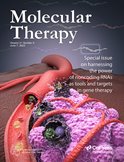The Vector
Editorial Team
Karen Bulaklak, PhD – Editor, The Vector
Jon Brudvig, PhD – Associate Editor, The Vector
Jessica Schneller, PhD – Junior Editor, The Vector
Inside This Issue
Leadership Message
Breaking Through
From Molecular Therapy
Society News
Career Center
Public Policy
Industry News
Leadership Message
Last Chance to Send Immuno-Oncology Abstracts

Hello, ASGCT members,
My name is Jeffrey Chamberlain, and I feel extremely honored to be president of ASGCT for the upcoming year. I’ve been a member of ASGCT since its inaugural year and am currently a professor and McCaw Chair in Muscular Dystrophy at the University of Washington. I look forward to working with a fantastic group of Board members and staff, as well as many of you, to continue growing the Society and expanding its impact around the world.
First, I want to thank everyone who joined us at the 26th Annual Meeting last month. I had a wonderful time meeting many of you and learning from your research. As I told my colleague Rayne Rouce, MD, this meeting gets better every year and always shows us how much there is to be excited about in this field. I hope those of you who attended felt that same energy and came away with new ideas to take back to your institutions. If you missed anything, registered attendees can watch on-demand sessions on the virtual platform through June 23. If you still need to register, do so through June 19 to watch on demand.
Today is the final day to submit an abstract to the first Spotlight on Immuno-Oncology Conference happening later this summer. This conference will bring together experts interested in going beyond the basics of cell therapy and CART for cancer treatment. If you’re conducting research related to novel CAR designs, b-cell malignancies, or another topic listed here, send it to us by 11:59 p.m. (PT) tonight. You can also register now for the conference, held in my home city of Seattle and virtually. If you’re in the IO space, I must say it’s a great time to visit Seattle!
I hope you’re all having a great beginning of summer and I look forward to working together this year.
Sincerely,
Jeffrey Chamberlain, PhD
ASGCT President
Breaking Through
Extracellular communication between brain cells through functional transfer of Cre mRNA mediated by extracellular vesicles
Rufino-Ramos D, Leandro K, Perdigão PRL, O’Brien K, Pinot MM, Santana MM, van Solinge TS, Mahjoum S, Breakefield XO, Breyne K, and de Almeida LP
DOI: https://doi.org/10.1016/j.ymthe.2023.05.012
Summary by Jon Brudvig, PhD
Since their discovery several decades ago, extracellular vesicles (EVs) have been surrounded by controversy. Initially dismissed as cellular artifacts devoid of biological activity, more recent studies have demonstrated a range of interesting functionalities for these small, secreted vesicles. Studies have shown that extracellular vesicles transfer functional proteins, nucleic acids, lipids, and metabolites, with a range of hypothesized roles in endogenous processes and disease pathogenesis. Given this functionality, researchers have also sought strategies that can exploit this vehicle for cell to cell transfer towards therapeutic ends. In a new Molecular Therapy article, David Rufino-Ramos, et al. share a series of studies demonstrating long-range transfer of functional mRNAs within brain-derived EV’s, setting the stage for new therapeutic strategies.
To monitor the spatio-temporal dynamics of brain-derived EVs in vivo, the authors utilized a Cre/lox system that enables highly sensitive detection of Cre mRNA transfer. With this system, producer cells package nuclear localization signal-Cre (NLS-Cre) mRNA in EVs, which are released and taken up by recipient cells. The NLS on the Cre localizes the translated protein to the nucleus, ensuring that it is excluded from the mRNA-containing EVs. Within the recipient cells, the Cre mRNA is translated and Cre protein then localizes to the nucleus, where it can activate a floxed reporter construct that serves as a permanent record of Cre activity in the cell.
Following an extensive series of in vitro and in cellulo validation experiments, the authors delivered their Cre construct to the brains of floxed reporter mice using a lentivirus. Over the next 16 weeks, the small pocket of transduced cells in the striatum packaged mRNA into EVs, spreading it throughout the brain. As might be expected, Cre mRNA was most concentrated close to the injection site but spread for at least 4600 µm in the anterior and posterior directions. While distal regions showed only minor evidence of cre activity at 4-weeks post-injection, distal reporter activity increased 10-fold by 16-weeks, suggesting cumulative effects over time. Remarkably, Cre mRNA was also detected in EVs isolated from blood serum, demonstrating very long-range activity for these brain-derived EVs.
These results demonstrate the potential for brain-derived EVs to deliver full-length, functional mRNAs to recipient cells over great distances, with important implications for therapeutic development, especially gene therapies. Adeno-associated viruses (AAVs) are a favored modality for gene therapy in the central nervous system (CNS), but they are entirely refractory for transducing certain cell populations like microglia, which have important roles in neurodegenerative disorders. If the mRNAs produced by AAV-transduced cells could be transferred to microglia and other untransduced cells, they could be “crosscorrected” and express therapeutic proteins. The approach used here showed great potential for such an application, even without engineering to enhance exosome production or mRNA packaging. By leveraging this and other new strategies, the therapeutic promise of exosomes may soon be realized for CNS gene therapies.
From Molecular Therapy

Latest MT issues: Check out the most recent issues of these Molecular Therapy family journals:
Society News
Submit Immuno-Oncology Abstracts by 11:59 p.m. (PT)
If you're conducting research in the immuno-oncology space that goes beyond the basics of cell therapy and CAR T cells, send us your work by 11:59 p.m. (PT) tonight! You may be able to present your work during the first-ever Spotlight on Immuno-Oncology Conference Aug. 1-2 alongside leading scientists in the field.
Watch #ASGCT23 Sessions On Demand Through June 23
Did you know if you registered for the 26th Annual Meeting last month, you can watch all sessions on demand on the virtual platform through June 23? Catch up on everything you missed during more than four days of the most innotative science in the field! If you didn't register, do so here through June 19 to watch sessions.
Apply for Career Development, DEI Awards Through Aug. 1
It's award season at ASGCT through Aug. 1, and this year we're giving out more than $1 million in funded awards to 12 members. Through the Career Development Awards, we'll give $100,000 each to six members working toward independence in their careers and the Children's Tumor Foundation will support three more. Through our Diversity, Equity, and Inclusion Awards, we'll suppport three awardees with a total of $250,000.
Career Center
Are you looking for a job in the field of gene and cell therapy? Check out the new ASGCT Career Center for great opportunities with industry, government, and academic organizations. Sign up to receive alerts for open jobs in your area.
If you're from a recruiting institution, advertise in the Featured Jobs section to target the 5,000+ audience of The Vector.
.png)
Featured Jobs
Public Policy
New Publication Sheds Light on Coverage Discrepancies for CGT Products
As a follow up to last summer’s front matter piece on public payor coverage of cell and gene therapies (CGT), ASGCT’s Government Relations Committee recently published an article titled Medicaid Coverage Practices for Approved Gene and Cell Therapies: Existing Barriers and Proposed Policy Solutions. This review outlines the current challenges surrounding equitable patient access to gene and cell therapies within the Medicaid system. The authors highlight the barriers to access and propose federal policy solutions to ensure that patients can readily benefit from this transformative class of therapeutics.
With the anticipated surge in approvals of gene and cell therapy products, it is crucial to address the existing disparities and limitations within the Medicaid system. The upfront costs associated with these innovative treatments, coupled with the projected larger patient populations, pose significant barriers to coverage for Medicaid beneficiaries. This comprehensive review specifically focuses on the discrepancies between state Medicaid coverage policies and the labeled indications of gene and cell therapies. The findings underscore the urgent need for federal policy interventions to create consistent coverage and foster equitable patient care.
ASGCT is committed to ensuring patient access to cell and gene therapies through appropriate, innovative payment models. Check out the article to gain insights into the current payment and access landscape, and discover how legislative and regulatory actions can pave the way for improved patient access.
Policy Issues Take Center Stage at ASGCT’s 26th Annual Meeting
ASGCT’s 26th Annual Meeting hosted a variety of policy-focused programming for the gene and cell therapy field. Highlights included:
- Sessions on How to Build a Successful CMC Framework for Your CGT Product
Both the CMC Development Challenges and How to Avoid Them workshop and the Comparability for CGT symposium shared case studies on effective CMC data applications for CGT products, and common issue areas when reviewing CGT portfolios. Expert presenters shared CMC best practices that can be utilized by developers to support the incorporation of manufacturing changes throughout the stages of drug product development.
By addressing CMC development challenges and providing a playbook for comparability, these sessions empower developers to make informed decisions, avoid pitfalls, and streamline the development process. Ultimately, by equipping developers with the expertise and strategies needed to overcome these challenges, ASGCT is working to ensure equitable patient care and accelerating patient access to transformative therapies.
- Discussion With High-Level Regulators and Industry Experts About the Future of CGT
As a continuation of the 2022 fireside chat with the European Medicines Agency, the Emerging Regulatory Trends session brought together senior leaders from global health authorities to discuss important aspects of their regulatory frameworks for cell and gene therapy products. Dr. Peter Marks with the Center for Biologics Evaluation and Research, and Dr. Yoshiaki Maruyama with the Pharmaceuticals and Medical Devices Agency (PMDA) described different approaches to accelerated review pathways, and unique challenges with supporting innovation and clinical development in their respective countries. The open Q&A saw further discussion on regulatory convergence and the formation of new guidance documents.
Dr. Marks joined a separate panel on Accelerated Approval of Cell and Gene Therapies. Presenters from academia, industry, and FDA level-set the history and scientific underpinnings of the pathway, and then shared their perspectives on the future of accelerated approval for CGT.
- Payment Policy and Patient Access for Newly Approved CGT Therapies
On the legislative side, two sessions discussed CGT payment policy and pricing, and reiterated the importance of coverage and reimbursement to ensure patient access. The Pricing Considerations in Genetic Therapies - Assessing Access and Privilege symposium outlined the key ethical issues involved in pricing, the unique development considerations for CGT, and the question of privilege in patient access.
The Medicaid Coverage and Reimbursement of Cell and Gene Therapies session took a more technical approach, looking at implementing value-based payment or outcomes-based arrangements from different payor perspectives. The presenters shared their experience navigating coverage and reimbursement through the lens of a CAR T provider, and outlined different experiences with coverage-to-label depending on patient location.
Registered attendees can watch all sessions on demand through June 23. Not yet registered? Sign up here for access to all Annual Meeting content. ASGCT appreciates all the presenters who lent their expertise to these important issues. The Society is excited to continue these conversations in other upcoming events, including the 2023 Policy Summit taking place September 18-19 in Washington DC.
Industry News
Interested in advertising in The Vector?
View the Rate Sheet